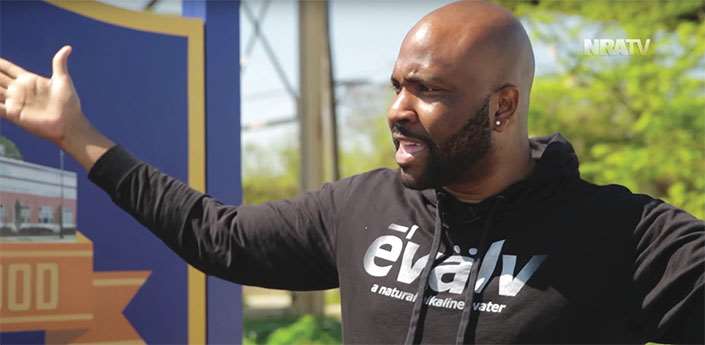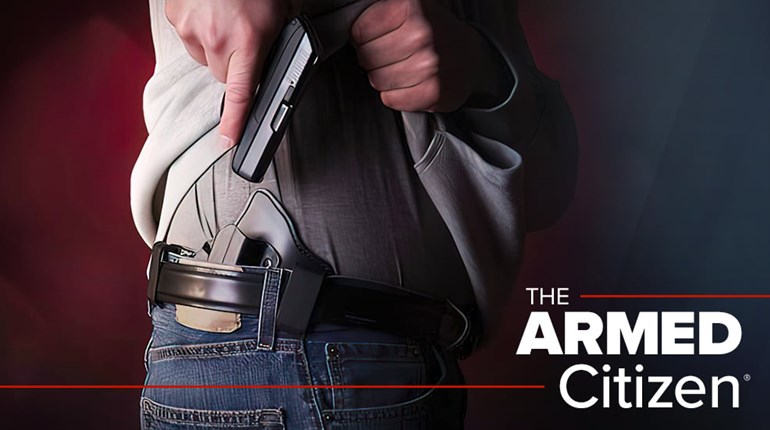
THE THIRD EPISODE of Season 7 of NRATV’s “NOIR” opens with a monologue admonishing America for Chicago’s sins. “This issue has been a silent issue far too long in this country,” the speaker intones. “Every day, you read a headline about a young man or young woman getting killed, and then you think about our history when John F. Kennedy was assassinated, Martin Luther King and Robert Kennedy. ... What did we learn? We turned our back on common-sense gun laws in America.”
The speaker is Richard M. Daley, mayor of Chicago from 1989-2011. His press conference is interspersed with footage of other Chicago mayors, all repeating the same theme: his father, Richard J. Daley (1955-1975); Jane Byrne (1979-1983); Harold Washington (1983-1987); and Rahm Emanuel (2011-present). All imposed the same draconian restrictions on citizens’ gun rights; all failed to halt the city’s descent into mayhem.
What did we learn, Mayor Daley asked? For one, that he and his political ilk are either powerless, or uninterested, in stemming the blood loss of their constituents. Secondly, when cornered, Chicago politicians will deflect the blame for their failure. “The truth of the matter is, for nearly 50 years, Chicago has been the hallmark city of gun control thanks to the policy decisions of protected, and disconnected, politicians,” interjects Colion Noir. “And he’s right about one thing: The violence continues day, after day, after day.”
IN “CHICAGO: THE REAL STORY,” available at NRATV.com, Noir travels into the heart of some of the city’s most troubled neighborhoods, like Hyde Park and Englewood. There, he finds longtime residents and community leaders who challenge the stereotypes we’re fed by the drive-by media.
In fact, Karim Shakir, owner of Hyde Park Barber Studio, challenges every media stereotype: He’s black, a business owner, a concealed carrier—and a Sunni Muslim. “Pray five times a day, I’ve been to Mecca for a pilgrimage, fast on the month of Ramadan ... everything,” he says.
Shakir contradicts the widely reported myth that urban blacks are anti-gun. He says black attitudes toward firearms are “mixed, from people who say, ‘I’m ok with people owning guns for protection,’ to those who are radically against any human being owning firearms.”
Shakir also objects to “how media portray us,” characterizing violence as a recent phenomenon with racist overtones. “It’s like it’s new, when this was the seat of violence—so much violence that the mafia told Al Capone, ‘Man, it’s too much,’” he says. “That was before any of us.”
In fact, Noir and Shakir wonder how much these media portrayals of blacks as “monolithic creatures,” who think only one way, actually cultivate that mentality.
Hip-hop artist and community organizer Leonard “GLC” Harris agrees. In his mesmerizing cadence, he rails at how media stereotypes perpetuate the problem. “What gets the ratings on the news is murder and mayhem,” he says. “If you constantly seeing murder and mayhem, boy, there’s a good chance you’re going to become a reflection of that.”

Harris despairs that media focus on problems, never solutions. “Do I want to be like, ‘Chicago is messed up?’ … because if I do that, I’m only adding to the problem,” he says. “I’m projecting the propaganda. But if people hold up greatness, there’s a good chance you will be a reflection of that.”
Harris expresses his take on Hollywood’s impact on Chicago’s black youth. “When I was a shorty, ‘New Jack City’ came out. ‘Scarface’ came out. ‘Menace II Society’ came out. ‘Colors’ came out,” he says. “If you didn’t know nothin’ about the drug game, it intrigued you. Because you wasn’t thinking about the consequences; you were thinking about the reward.
“You thinking like, ‘Man, my mama going to work, my daddy dead or he ain’t around …’ TV can become your father. The movies can become your father.”
Harris continues: “What we gotta do is enlighten the brothers and sisters to our history. I’ve seen a few guys talking about, ‘Our ancestors are not important, our history is not important. All we need to worry about is what’s going on right now.’ That’s the rhetoric of a damn fool.
“The more you are reminded of the greatness of your ancestors, you feel invincible. You feel powerful.”
IN CHICAGO, black attitudes toward Second Amendment freedoms are more nuanced than liberal media would have us believe. There, Noir meets some residents whose understanding of the value of firearms freedom resembles the views found in the pages of this magazine—which would surely come as a surprise to those who learn everything they know about the South Side from cable news.
Chip Eberhart, a master instructor with Top Shot Academy, says, “When I grew up, I … thought the only people who had guns were criminals and the police, and as long as you think like that, that’s the only people who are going to have guns.
“What sense does that make? I’m a former police officer, but the reality is that if you don’t have a firearm to defend yourself, you’re not getting a first responder; you’re getting a cleanup crew.”
Businessman Dave Jeff is the owner of PHLI Inc. “We’re in bad times,” he says. “I want to be prepared. I want my family to be safe. I want to be able to obtain (a gun) legally, get as many as I want.”
Shakir agrees. “I own several firearms for one reason: I want to be able to protect my family. I pray to God that I never … in my life … ever have to fire a firearm at another human being.”
“The great Malcolm X, he even said ‘Love your brother, treat him as a brother,’” Harris explains. “But the moment he tries to harm you or anything you love, you gotta send him to his grave.’”
In print, their comments could just as easily have come from rural Wyoming.
IT’S CLEAR to these South Side leaders that Chicago gun control has failed to stop the city’s criminal violence. So why the continued obsession with gun control? Some in Chicago’s black community are suspicious of their elected leaders’ motives.
Shakir feels it’s purposeful. “It’s almost as if it’s a diversionary tactic to divert people’s attention from the real things that need to be done,” he says. “Why is it that these people, who we depend on, we vote for, we think are smart people, can’t figure out something? It’s almost as if they don’t want to.”
He believes three things will turn the South Side’s fortunes around: “Access to resources: jobs, being able to build businesses. Number two: the rebuilding of the family structure. Point blank: education.”
Harris describes how, after the Civil War, black sharecroppers migrated from the South to northern cities, where they found good-paying industrial jobs. “They get money, they taking care of their families,” he says. “Then the rug is snatched up under the feet. And now you just be like, ‘This ain’t no industrial economy no more, this is a service economy. Y’all gotta get with this.’ But you don’t set up anything for these brothers to make a transition.”
However, establishing job training programs and improving schools cost more money than banning guns. Eberhardt describes the depth of the city leadership’s obsession with gun control: “Mayors in Chicago had such a [expletive] for guns, to show how evil guns are, if they caught a guy with drugs, they’d tell him, ‘We can make this drug charge go away if you can get someone to sell us an illegal gun.’”
NOIR ANSWERS the phone from his car somewhere on the highway north of Dallas. In the middle of producing the seventh season of NRATV’s “NOIR,” he’s answering a lot of calls after the release of “Chicago: The Real Story.” His conversations on the South Side streets reveal the futility, hypocrisy and brutality of the city’s gun control prescription as a remedy to a decades-long homicide epidemic that refuses to respond to treatment.
“There’s this element of the leadership fostering a level of dependence that perpetuates the cycle,” Noir tells me. “They almost need the community to be in the state that it’s in, because then you can sell a dependency on the government. You can’t sell that to a group of people who are autonomous, or self-reliant, or independent.
“If violence stays at the level it’s at, you can always say, ‘It’s their fault over there because they won’t let us give you more gun control. You should never vote for them.’ You can always look like the champion, when in reality you’re just an elitist who comes into the community when you want to get re-elected, and you’re never seen again until the next election cycle.
“The status quo keeps them in office.”
However, Noir believes that the truth is seeping into Chicago’s South Side. “The extreme Left has gotten to the point of idiocy,” he says. “People are slowly maneuvering toward the middle and are more open to a conversation. What the radical Left has been doing is trying to stifle conversation. They understand that the more information people have, the less control they have over them.
“For instance, me going on Bill Maher (who is an admitted leftist), he also understands that the extreme Left has taken things a little too far. On the issue of guns, you can actually disagree with the side that you’re on, and see some merit on the other side. That’s when you start heading toward a solution and bringing people together.”
Noir defies a media/political narrative that blames guns for Chicago’s crime. “What I saw there isn’t the result of a lack of accountability,” he says. “This is a deliberate negligence and mismanagement. This one episode didn’t even scratch the surface of these issues.”
Ultimately, Noir has faith in Chicago’s residents—in their ability to take back their power, to arm themselves with information, to fight to shrug off the yoke of control with which city leaders have burdened them for decades.
“No political party can undermine the genesis of this country, which is the importance of the individual, of independence, of freedom,” he says. “That idea is woven into the fabric of this country; there’s no getting away from it. No matter how much you try to control thought, individuals will seek information to a degree that allows them to develop their own thought process.”
This awakening is a concept that Harris describes succintly: “If everybody do their part, there’s a chance we could get led into the light. ’Cause, if the system is against us … why are we against us?”
Here’s an idea: Leonard “GLC” Harris for Mayor.
Clay Turner is the creative director for NRA America’s 1st Freedom magazine.


































